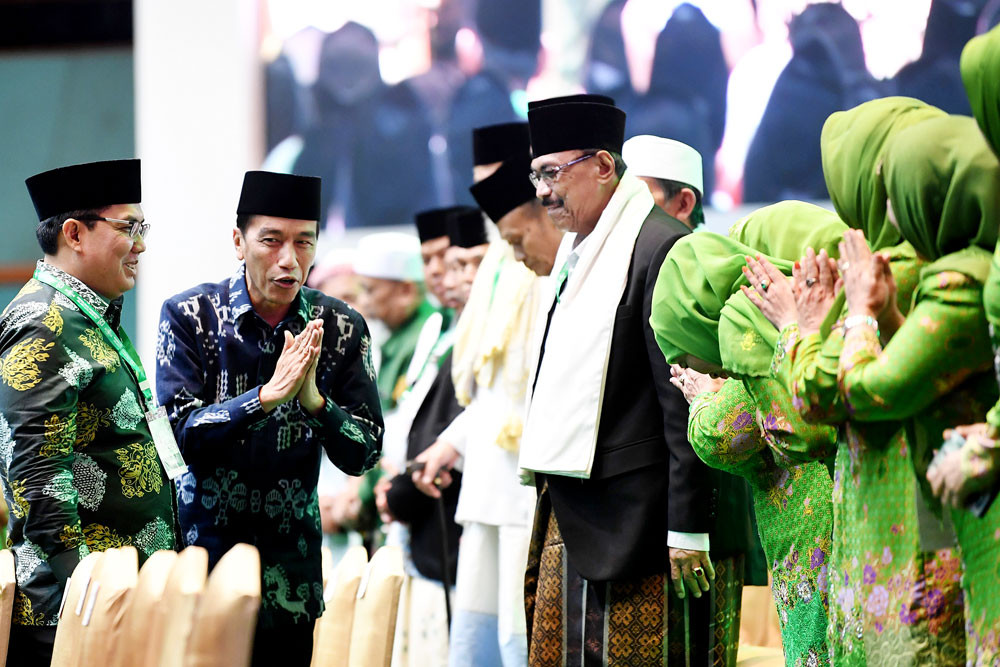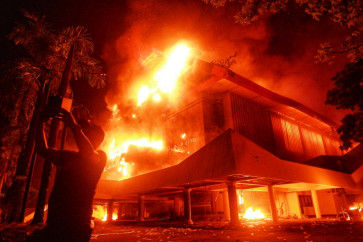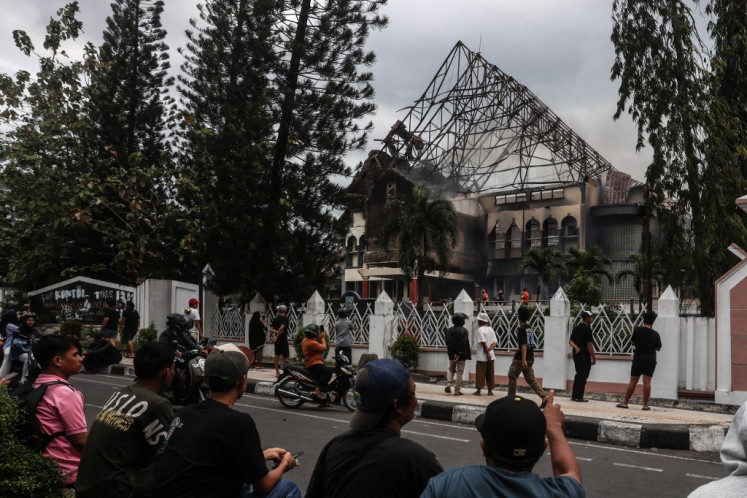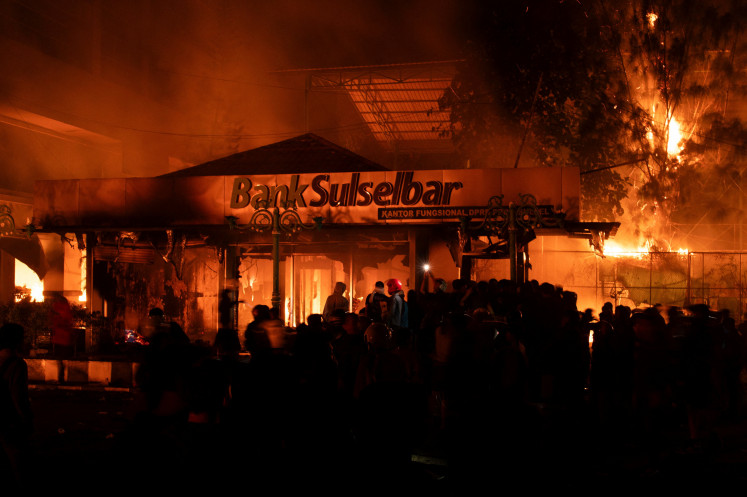Popular Reads
Top Results
Can't find what you're looking for?
View all search resultsPopular Reads
Top Results
Can't find what you're looking for?
View all search resultsTaliban and Indonesia – The case for lone wolves
Extremism thrives on marginalized people and vitriolic majorities hell-bent on curbing the lives of others, which is exception rather than the norm in Indonesia.
Change text size
Gift Premium Articles
to Anyone
A
s the Taliban takeover of Afghanistan unfold dramatically, the implications of this might be felt much farther than just South Asia. Certainly Indonesia, with its greatest concentration of Muslims compared to any other country in the word, might face a spillover from this phenomenon, as it did during the ascension of Islamic State (IS).
Indonesia is a democratic republic, which rankles with the Islamist extremists, as they would purportedly want to see it become an “Islamic” state. Therefore, symbolic or not, Indonesia would always remain a target for extremists in their search of what they perceive as an Islamic utopia.
Be that as it may, Indonesia has remained robustly resistant to this extremist dominance despite many setbacks, starting from the Bali bombings in 2002. There have been alarm bells ringing over the past years about pervasive extremism; this is definitely a challenge, but the magnitude of this change is still very manageable.
Indonesia has suffered comparably infinitesimally less Islamist terrorism than Syria or Iraq or Afghanistan or Pakistan, while having comparably far larger Muslim populations. This implies some structural resilience in the country that makes it robust against these phenomenon.
The reasons for this stoic robustness range from political to cultural to governance related paradigms, and many more. One of the biggest reasons is the sheer diversity of the country. Indonesia as a vast archipelagic nation has a huge number of ethnic groups, numbered at around 656 by some accounts, while the Indonesian Education, Culture, Research and Technology Ministry has recorded around 500 living languages.
Indonesia simply has so much access from the world and from its regions at large that it is impossible for Indonesians to live away from outside engagement, and the society has thus become multicultural and tolerant at its core.
Extremism thrives on marginalized people and vitriolic majorities hell-bent on curbing the lives of others, which is exception rather than the norm in Indonesia. One could argue about the dynamics of Poso in Central Sulawesi and Aceh which spawned a peculiar type of extremism, but the Aceh/Poso model is not at all ubiquitously pervasive around the country. In fact, though there are detractors, Pancasila with its message of inclusiveness holds much more traction than the centrifugal forces of extremism.
This core of Indonesian tolerance plays out in favor of political leadership having to accept this culture of tolerance. There have been many challenges to the established norm of inclusiveness over the years by actors such as Jamaah Islamiyah, Hizbut Tahrir etc. However, the state has remained resilient to these challenges because Indonesia has a peculiar governance worldview.
A peculiar characteristic of the Indonesian political stratagem has been that post-reformasi, two major religious institutions the Nahdlatul Ulama (NU) and Muhammadiyah have been embedded within the state and society, which has ensured that the extremist project loses any logical arguments about religion being marginalized within the secular republic.
Unrelated as it may seem, right wing groups have been trying and not really succeeding in putting in place a stringent anti-alcohol law. The very fact that this bill has faced resistance implies that Indonesian legislators, sensitive to the sentiments of the public, do not want to promulgate anything that gives leverage to right-wing groups to demand more, as they tend to.
This is not about drinking alcohol, which in any case is not really widespread in the Muslim citizens of Indonesia. This is about the sentiments of non-Muslim minorities and perception of Indonesia to the international community, which besides other things, considers Indonesia a major tourist destination.
This sensitivity currently precludes any draconian measures by the state to impose the will of a majority, without seriously considering the rights of minorities. If the anti-alcohol law cannot really gain traction, then even more stringent laws such as the blasphemy laws might also eventually cease to be instruments of political controls.
Indonesian counterterrorism networks have also evolved exponentially, especially the Densus 88 counterterrorism squad, and international and regional linkages ensure that Indonesia is the recipient of and provider of valuable inter-governmental coordination against terrorism and extremism.
One could put forward many more arguments, but suffice it to say that extremist ideology does not really seem to occupy center stage, at least for the time being. However, the newly emerging Afghanistan obviously presents flash points.
An obvious point of concern would be that Indonesian militants have a lineage of established relationships with Taliban, whether it be training or being part of networks. This includes the Bali bombing perpetrators. However, the more recent spate of terrorism has been IS associated, with Indonesians foreign returning fighters and leadership such as Bahrumsyah, Bahrun Naim and more recently Saifullah. inspiring or leading homegrown terrorists such as ones involved in the 2018 Surabaya bombings, and others.
Indonesia has in recent years been facing IS-inspired terrorism. However, the groups should be differentiated from the ones connected to Taliban. Taliban could loosely be said to be more inclined to al-Qaeda, but al-Qaeda is inherently opposed to IS. Dissecting this triangular relationships, since IS and al-Qaeda (and by implication Taliban) are mortal enemies, the IS-inspired militants in Indonesia would expect little support from Taliban leadership.
Also, since the Taliban seem to at least be pretending to “woo the world” and claiming not to harbor any terrorist groups or terrorist intentions toward any country, one could argue that at the very least they would try to keep up this pretense some time longer, and would not immediately support international terrorism. This plays out in favor of Indonesia, amongst other countries for the time being.
A more pressing point of concern is that homegrown extremists or “lone wolves” would be considerably emboldened by the Taliban success to start forming local networks, in aspiration of subservience and fidelity to the Taliban state. This was seen most recent in Syria, where the huge number of foreign fighters were highlighted.
Even more importantly, when Abu Adnani, the deceased spokesman of IS, gave a call of “jihad” this prompted a vicious pate of terrorist attacks in many countries; there were instances when extremists who had never traveled outside to any jihadist theater, and had no foreseeable material support from IS, carried out attacks with whatever they could use. These attacks ranged from extremists using knives and hatchets, to mowing down targets with vehicles, all in obedience to Adnani’s call.
Such was the appeal of establishment of caliphate by IS, the first time such an event happened in recent history; the second event of a comparable (perhaps much bigger) magnitude is the takeover of Afghanistan by the Taliban. This takeover is even more significant since the Afghanistan issue seems now to be an orphan.
This is and should become the primary focus for the Indonesian counterterrorism apparatus, especially the Densus 88. The utility of inciting local extremists to “rise up” and do jihad with any available means is an old rallying cry, and has been used with resounding success all over. This could very well become a tactic of choice, and Indonesia’s counterterrorism apparatus should gear up to meet this challenge now, rather than later.
***
The writer is a counterterrorism and counter extremism academic and practitioner.










